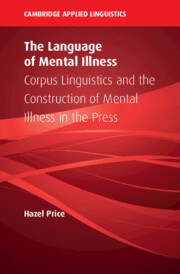 The Language of Mental Illness
The Language of Mental Illness Published online by Cambridge University Press: 05 May 2022
In Chapter 6, I argue that the terms ‘mental health’ and ‘mental illness’ have been used interchangeably in the previous literature on the representation of mental illness in the press. Specifically, I argue that using these two terms interchangeably (especially during data collection) may result in incomparable datasets. Through linguistic analysis, I show that the terms ‘mental illness’ and ‘mental health’ are distinct terms, and that the meaning of the two terms has shifted over the time period covered by the MI 1984–2014 Corpus. I argue that the lexical change I observed is consistent with pragmatic accounts of language change in which the language development is in part a result of euphemism (e.g. Traugott & Dasher, 2002).
To save this book to your Kindle, first ensure no-reply@cambridge.org is added to your Approved Personal Document E-mail List under your Personal Document Settings on the Manage Your Content and Devices page of your Amazon account. Then enter the ‘name’ part of your Kindle email address below. Find out more about saving to your Kindle.
Note you can select to save to either the @free.kindle.com or @kindle.com variations. ‘@free.kindle.com’ emails are free but can only be saved to your device when it is connected to wi-fi. ‘@kindle.com’ emails can be delivered even when you are not connected to wi-fi, but note that service fees apply.
Find out more about the Kindle Personal Document Service.
To save content items to your account, please confirm that you agree to abide by our usage policies. If this is the first time you use this feature, you will be asked to authorise Cambridge Core to connect with your account. Find out more about saving content to Dropbox.
To save content items to your account, please confirm that you agree to abide by our usage policies. If this is the first time you use this feature, you will be asked to authorise Cambridge Core to connect with your account. Find out more about saving content to Google Drive.